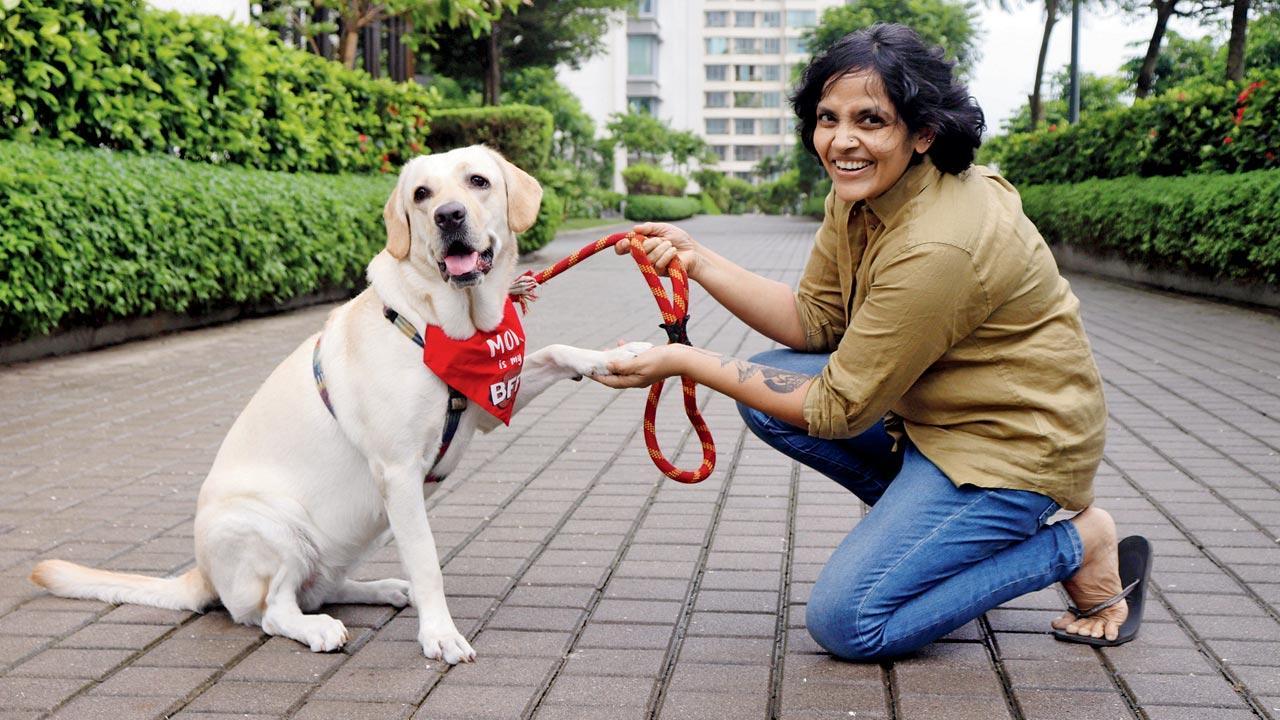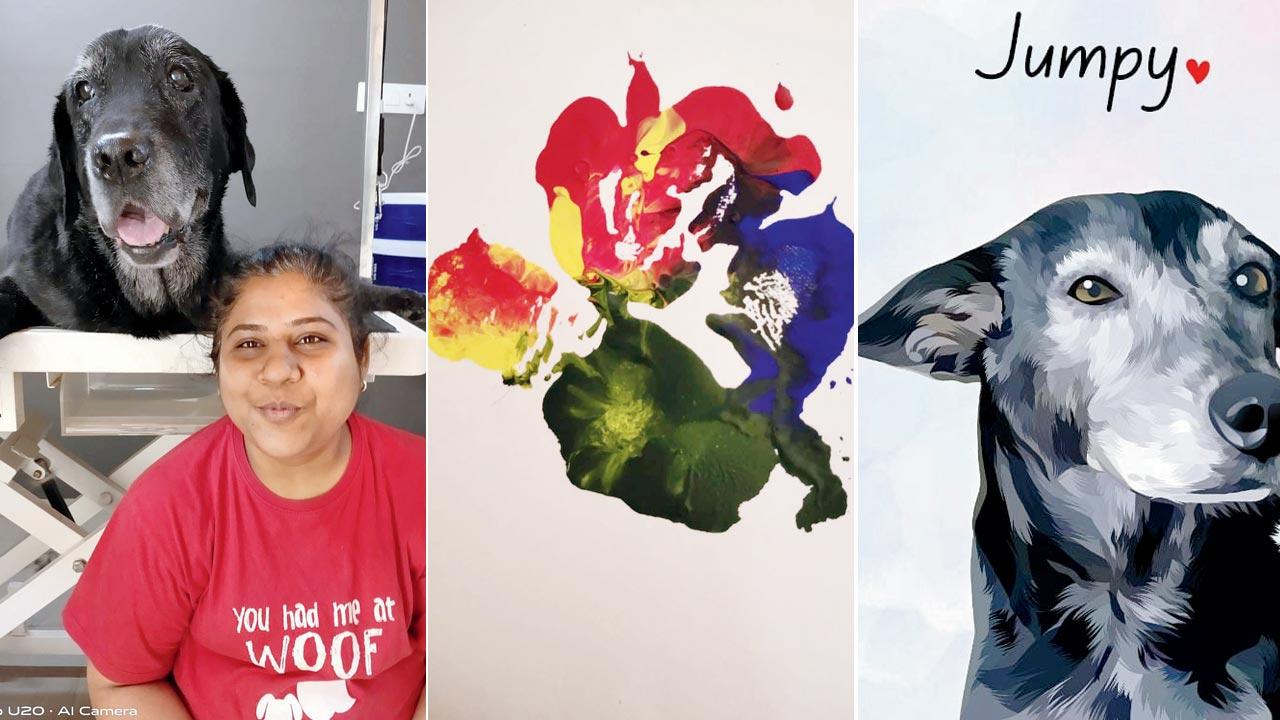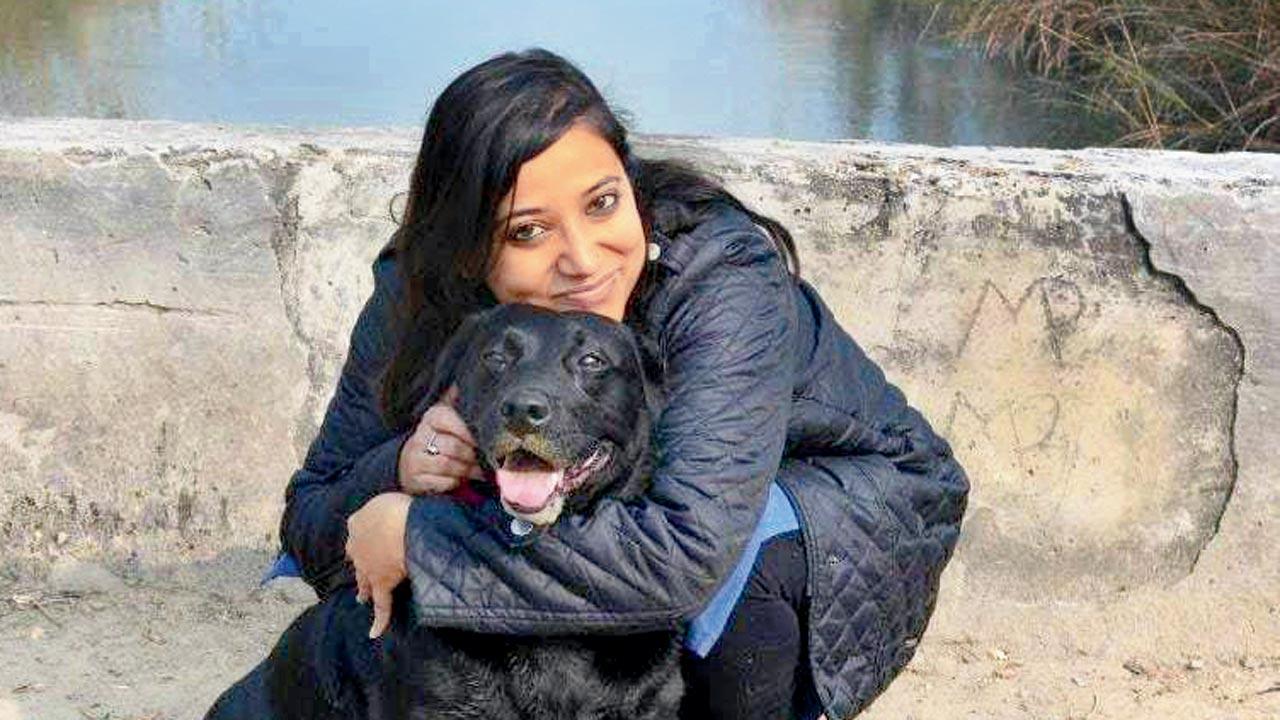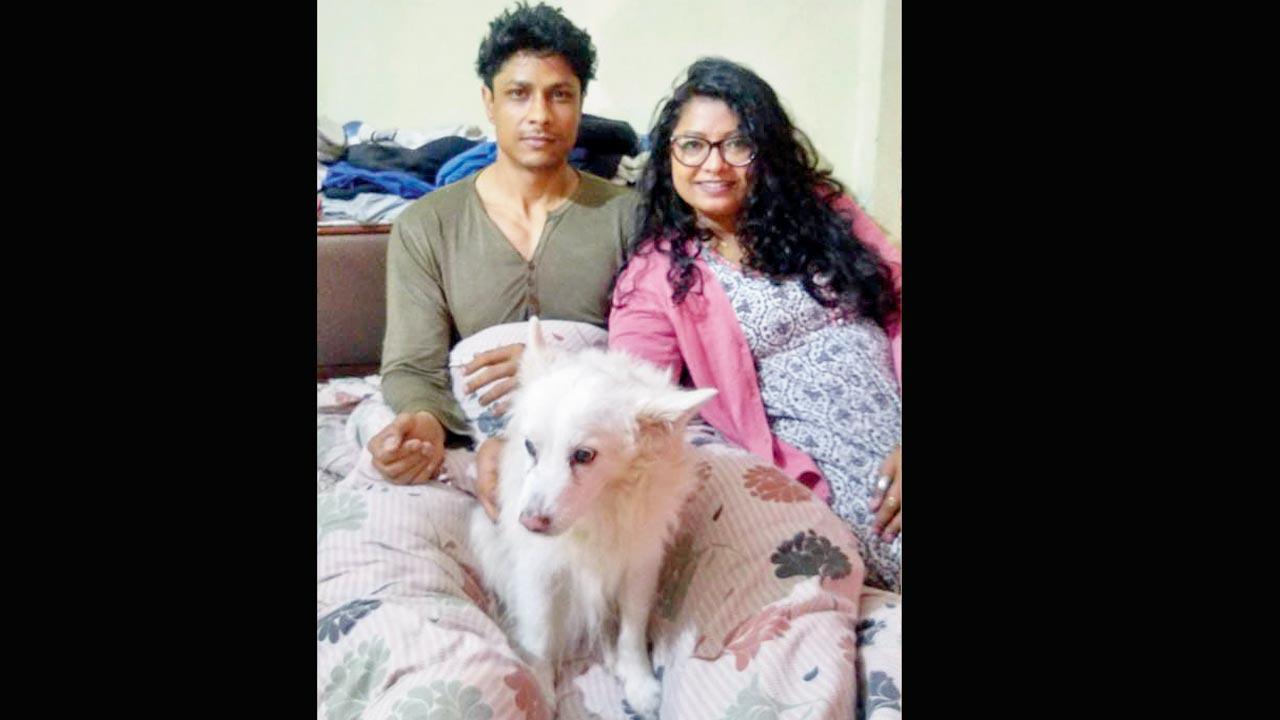With no cultural or social mores for support, animal bereavement is a lonely grief, say pet parents

Goregaon resident Arathi Sen (seen here with Shiuri), who calls herself a professionally-trained dog lover, says that because even the Indian Penal Code describes animals as “property” that we own, it means pets are “replaceable, transferable”; “That’s how non-animal people see it.” Pic/Anurag Ahire
Here are some things you don’t say to someone who has lost a pet, never mind if s/he was a dog, cat, or fish: ‘How old was s/he? Oh that’s a long life’, ‘You should get another pet’, ‘Are you still sad about that?’, ‘C’mon, it’s only a pet…’
Shrinkhla Sahai and Sharon D’Souza Pretto call the pain of losing an animal companion disenfranchised grief: A grief that society does not understand or recognise, and hence holds no space for it. “There isn’t enough understanding about pet bereavement, socially or culturally,” says Sahai, a cultural psychologist based in Delhi, “or how much it can affect you. Sometimes, even the human is not aware of it.”
 Pune-resident Namrata Dixit says thankfully her boss was understanding when she requested leave after the passing of her 17-year-old pet, Leo
Pune-resident Namrata Dixit says thankfully her boss was understanding when she requested leave after the passing of her 17-year-old pet, Leo
Sahai is founder-secretary of Swayam Foundation that holds support group meetings online, periodically, for those who have lost a loved one. “One lady, who was interested in attending a session, asked, ‘I lost my dog five years ago. Can I still come?’ I told her of course, she can. Grief does not adhere to a set timeline, which also society finds baffling when it comes to pets.”
Pretto, an emotional intelligence facilitator and life coach, explains it best: “Grief is not linear; it’s an intangible mess. And there are many kinds of grief, which society does not recognise. Like, say, that of a neighbour passing away. People are surprised that you are [still] sad over the departure of someone who only lived next to you. So, animals are a tall order.”
 Mitali Shrotriya, a dog behaviourist in Pune, lost two senior dogs in quick succession. Seen here with Labrador Nick; and a sketch of street dog named Jumpy. The family took Nick’s paw imprint as a keepsake
Mitali Shrotriya, a dog behaviourist in Pune, lost two senior dogs in quick succession. Seen here with Labrador Nick; and a sketch of street dog named Jumpy. The family took Nick’s paw imprint as a keepsake
Mitali Shrotriya, a dog behaviourist in Pune, lost two of her senior dogs down, in close succession during the pandemic. One, a black Labrador called Nick, aged 14-and-a-half years, had to be put down due to a series of debilitating and terminal illnesses ; the other, a 16-year-old street dog named Jumpy, passed away of renal failure.
“My family and I were at peace with the decision [of euthanising Nick],” says Shrotriya. “He was old, paralysed and had been ill for long. We took the decision jointly. There was judgment about that. One aunt said, ‘You must be so relieved; you don’t have to plan your routine around Nick anymore. You can do whatever you want, go wherever you like…’ But we were never encumbered. The duties were divided among all four of us, and we had a reliable boarding place he would go to when we travelled.”
 Shrinkhla Sahai is founder-secretary of Swayam Foundation that holds support group meetings online for those who have lost a pet. When her Labrador Kaya, who worked with her as a therapy dog, was battling cancer, she told people she was caring for a family member who was terminally ill
Shrinkhla Sahai is founder-secretary of Swayam Foundation that holds support group meetings online for those who have lost a pet. When her Labrador Kaya, who worked with her as a therapy dog, was battling cancer, she told people she was caring for a family member who was terminally ill
There was a difference on how her neighbours and family responded to each dog’s death, related just to the breed. “The day before Nick was euthanised, people came to see him, brought his favourite food, video-called us,” she says, “Jumpy got one-tenth the visitors, and fewer calls and sympathy. When Nick passed away, an adoption co-ordinator for stray dogs actually said, ‘Next time, get an Indie; they live longer…”
Pretto cites the case of a person grieving the passing of a rabbit. “Her sister said, ‘Good riddance’ as the rabbit created a lot of mess; while some colleagues said, “Now you can save money and do what you want’.”
 Meenakshi Bhanj Deo, a former HR consultant, says countries like New Zealand have grievance leave of six to seven days for the death of a pet. When her pet of 17 years, Simba, passed away, she says condolence calls and texts petered out after a day
Meenakshi Bhanj Deo, a former HR consultant, says countries like New Zealand have grievance leave of six to seven days for the death of a pet. When her pet of 17 years, Simba, passed away, she says condolence calls and texts petered out after a day
The kernel at the centre of this indifference is the understanding about what a pet might mean to a person. For many, increasingly so, as fertility rates drop and couples choose not to have children, they are child-substitutes. For those living alone in a city, away from family, they are kin. For professionals such as Sahai, whose black Labrador Kaya worked with her as a therapy dog, they are partners. “Even our laws,” says the self-described professionally-trained dog lover, Arathi Sen, “describe animals as ‘property’ that we own. And ‘ownership’ is replaceable, transferable. That’s how non-animal people see it.”
For many, the relationship with their pet is the primary one in their lives.
“One client came to me and said she felt invisible after the passing of her dog,” says Sahai, “though she had a partner and a thriving social life. Pets bear witness to so much of our lives, especially dogs, who are very attuned to the human’s moods, movements, body-language and facial expressions. She was her 14-year-old dog’s primary handler and care-giver, and dogs have a way of making you the centre of their lives and attention. To them, you are their whole world. With this gone, she found life disorienting.
When there is no recognition of this relationship, there is no acknowledgment of the grief, and no space for it. Meenakshi Bhanj Deo, a former HR consultant, says countries like New Zealand have grievance leave of six to seven days for the death of a pet. In India too, some corporates understand the bond.
“When my dog Leo died at 17, I requested my office for leave,” says Namrata Dixit, a security awareness and culture manager from Pune. “My boss responded saying ‘Take all the time you need’. Many places I have worked in are very understanding of an employee taking the day off at work because of a vet visit or animal rescue situation. You can see that the culture is improving; increasingly more restaurants and community places are allowing you to bring your pets along. They recognise that the pet is a family member.”
Bhanj Deo’s observation is that many of us don’t have a vocabulary to address death, be it of a human or an animal. “When my father passed away,” says the Parsik Hill resident, “many people did not know what to say to me or how to talk to me. A lot of people don’t have the words to show support for a loss. They mostly think of talking about other things to distract you from the grief.”
Shrotriya agrees.
Though Kaya was well-loved among her patients, Sahai would not mention her illness (cancer) when rescheduling client appointments to take Kaya to the vet. “I didn’t think they would understand, so I would say a family member is terminally ill,” she says. In the same vein, people may not understand why you are refusing social invitations or not in the mood to celebrate festivals.
When her pet of 17 years, Simba the Indian Spitz, passed away in Bhanj Deo’s hometown of Jaipur, those who knew what he meant to her called, or messaged or video-called her to commiserate. But this was for a day; not a prolonged support. “Especially since I was away from home, friends [in Mumbai] would come over, talk about Simba and then the conversation would take another turn,” she says. “My husband, Vikram, held space for me to flip out, cry. He let me be.”
Sometimes, one is not even aware they are grieving the loss of a pet. “A client came for counselling because she had lost a family member to COVID-19,” says Sahai. “As we were speaking, she told me about her cat, who had also deceased around the same time. She hadn’t been able to grieve for her and it was festering.” The space to express grief over the death of a feline companion is even smaller, because society sees cats as selfish, cold, and unloving. But any cat parent will tell you, they merely have a different way of expressing their love. And when they bestow it, it’s a rare honour.
“You associate death with illness and old age,” says Sen, “so when a young puppy dies, it pulls the ground from under your feet. When a puppy I was training was diagnosed with [the lethal] parvovirus, I immediately did the math for his odds of survival. When I received his body wrapped up as a package, and then opened it at the crematorium, it changed me. I did not know I could feel so much for a pup who was not mine and whom I had only met for a few weeks.”
Unexpressed grief festers into anger outbursts, inability to focus, detachment and sadness. In cases of sudden death or euthanasia, there is extreme guilt and self blame as your wonder if there was anything more you could have done to save the pet. It affects self-value and future relationships, and guilt holds you back from moving on.
This need for space propelled Sen to form a support group with Pretto. “When you have a bond with your pet, the joy is strong, and so is the grief. Many people lose their present worrying about how much time they have left with their companion. Others don’t want to get another pet to avoid revisiting that loss.”
Pretto hasn’t had one since 1988, when a Sydney (Silky) terrier puppy she had for merely two weeks passed away of an infection. “For the longest time, I was angry with the person that I got the puppy from,” she says. “It also made me possessive in my relationships; trying to control my loved ones as much as I could to secure them from harm. It was only when I was preparing for the first seminar on pet grief that I realised the anger came out of unrecognised grief.”
This is where rituals and symbols help. “Rituals help you centre your grief on something. They give you time and space to think only about your dog,” says Sahai, “It gives you closure, a timeline, slow reintegration back not life and a path to continue your relationship with the pet. We held a memorial ceremony for Kaya where all the people whose lives she had touched, and her friends came and told stories about her.” Bhanj Deo’s brother shaved off his head on Simba’s death, like he would for anyone from the family. Many don’t observe festivals for a full year.
Like any other kind of sadness, this one too has to go through the stages of grieving: Numbness, denial, bargaining, anger, depression, and finally, acceptance. Being able to continue the bond with the deceased, in another form, is important last step in the grieving process. “I have picture of Kaya in my clinic,” says Sahai, “which I garland with fresh flowers every day, as I would a family member’s. I look to her at times, as I would when she was here, asking, ‘C’mon, tell me what to do.”
To sum it up, never say to a grieving person, “S/he’s in a better place now.” In Sen’s words, “How the f*@# do you know?” Because, any pet parent will tell you, his/her best place was in their life; and yours in theirs.
How to help a friend deal with grief
Shrinkhla Sahai, Cultural Psychologist
“The best way you can help a friend dealing with such a loss is hold space for them to talk about their pet. Help ritualise it, in the way befitting their belief system. Take care of the logistics: Drive them to the crematorium/cemetery, handle the paperwork, send over food, drop in to make weekly checks or organise a condolence meet—everything we do socially and culturally for a human being [will work].”
How to process grief

Sharon D’Souza Pretto, Emotional Intelligence Facilitator
“If you’ve lost an animal companion and are going through some intense feelings, name the emotion to tame the emotion. Each emotion has an entire range, so recognise it as ‘sadness’, but not ‘depression’; ‘anger’, but not ‘fury’. That’s the first step. Then, write your pet a note. It may seem trivial, but tell her of all the ways in which you have grown because of her, your best memories, what you have learnt from her. Celebrate her life after you’ve mourned her death.”
 Subscribe today by clicking the link and stay updated with the latest news!" Click here!
Subscribe today by clicking the link and stay updated with the latest news!" Click here!








